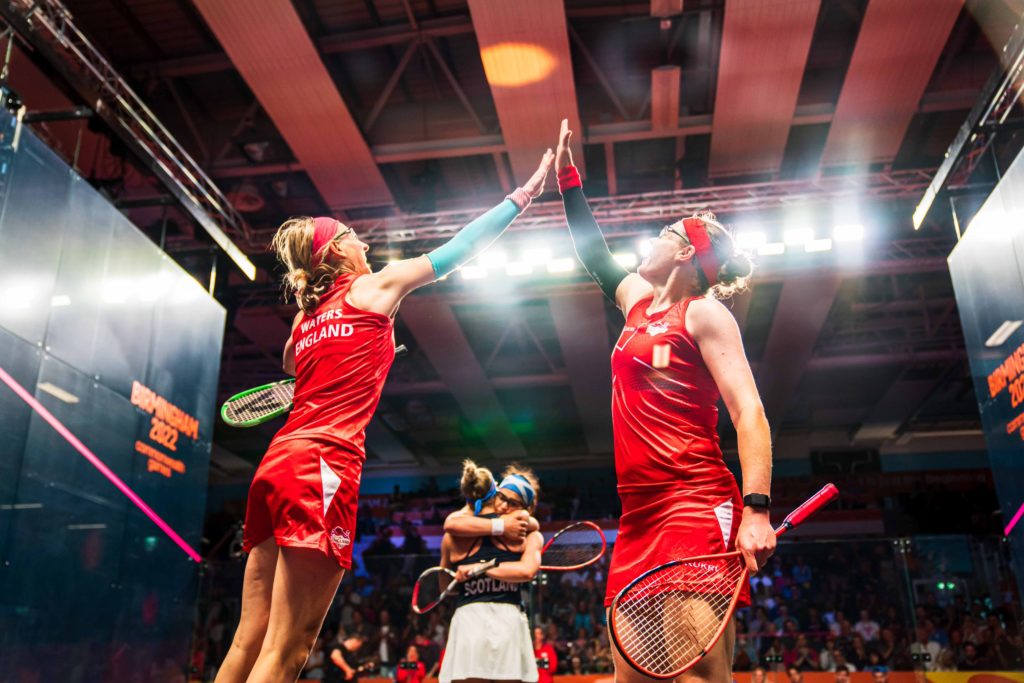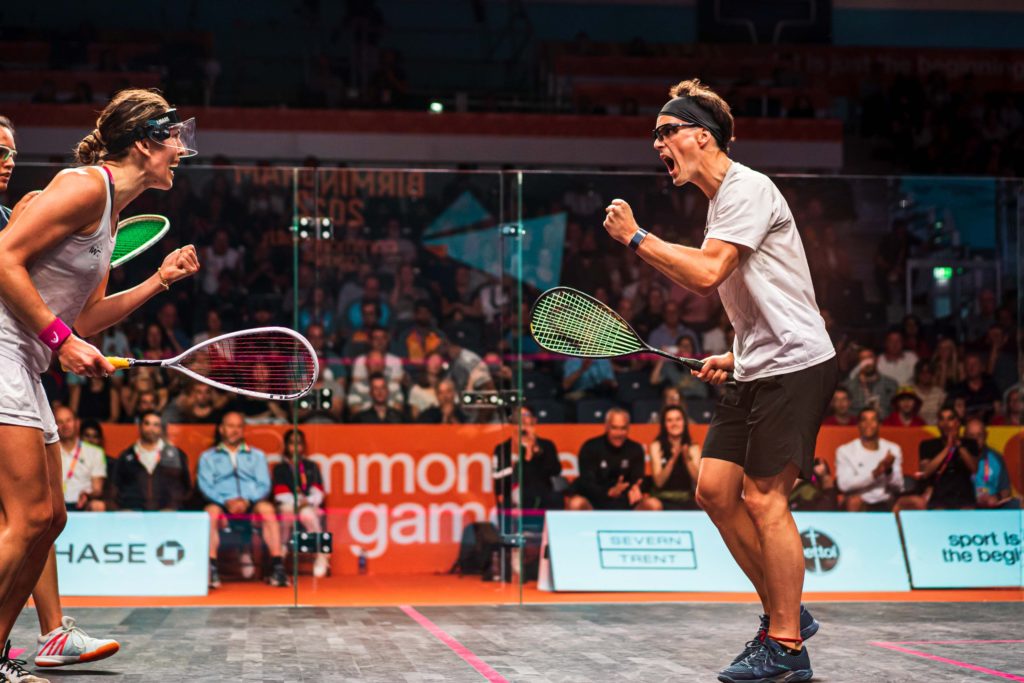
by James Zug
When I was working at the 2022 Commonwealth Games in Birmingham, a lot of fellow journalists asked why I was there, since the U.S. was not competing.
It was an easy answer. The Commonwealth Games are far and away squash’s biggest moment. Every four years the Games expose the game to the non-squash. The media attention in the seventy-two nations competing in the Games is massive—social, radio, television, print, online. I heard Jahangir Khan on the radio talking about squash. The call for Gina Kennedy’s gold medal victory was replayed again and again for news bulletins.
Pro squash events typically struggle to fill all the seats in the opening few days of a tournament. At the Commonwealth Games every session was basically sold-out. I attended the first match on the first day—on a Friday at noon—and the place was packed. Many were squash fans but many were not. People wanted to attend something at the Games, and if they didn’t get tickets for their first choice, they came to squash and loved it.
The opening ceremonies were a tremendous visual example of why it has been great to have squash in the last seven Games. It was a real spectacle—nearly three hours of singing, dancing, flyovers, thunderous fireworks, hundreds of actors, seventy-two classic cars forming a Union Jack, giant puppets, a thirty-five foot steam-breathing mechanical bull and speeches by leaders like Nobel Prize winner Malala Yousafzai. It was amazing to sit among hundreds of reporters in the press section and watch them all stand up and sing “God Save the Queen” and then clap, with the rest of the thirty thousand spectators, in unison to Queen’s “We Will Rock You” in true Live Aid fashion. Squash was definitely in the mix that night. During the parade of nations, seven flagbearers were squash players (just four other sports had more) and Nicol David gave a video message to the Malaysian cohort.
More than a billion people watched the opening ceremony live on television.
Another reason I went was that there were probably more American-based people at the Games than any other country. One Australian player joked that almost the whole Aussie team lived within a few miles of each other outside New York.
Yes, a few leading squash nations don’t come to the Commonwealth Games, most notably France, Spain, Germany, the U.S. and very much most of all, Egypt. But the majority of the top players were there in Birmingham, and it made for spectacular storylines.
In the singles, it was brilliant. In the quarters, Lucy Turmel, facing Joelle King, saved ten games balls in one riveting, twenty-nine minute game. Gina Kennedy squandered three match balls in the fourth game of her semis against Sarah-Jane Perry, saved a game ball and finally took the match. In the finals against Hollie Naughton, Kennedy won the first two games, hopped back from a 10-4 deficit in the third, only to squander a championship ball and lose the game, and yet she still has the presence of mind to recover and win the fourth game and the gold medal. Perhaps the match of the tournament was for the bronze medal: Perry went down 2-0 and 8-4 in the third against King before mounting an electric comeback. Both women had match balls in the fifth before Perry closed it out 14-12.
The final of the men’s draw was equally dramatic. It went to five games, with Paul Coll nosing out Joel Makin 11-7.

In the three softball doubles tournaments which closed the Games, there was more excitement. For one, Greg Lobban, representing Scotland, played against his wife Donna Lobban, representing Australia. Donna (and Cam Pilley) escaped with a 9-11, 11-8, 11-8 victory.
Coll & King took gold in the mixed doubles. Afterwards, a pumped-up New Zealand contingent performed the signature Haka dance in their seats in honor of their victory. Another story of the doubles was how many retired or close-to-retiring players dominated. Alison Waters, who retired last year, took silver in the mixed and the women’s; Amanda Landers-Murphy, who left the tour in 2019, won gold a second time in the women’s; and James Willstrop (age thirty-eight) and Daryl Selby (who retired during the Games) squared off in the men’s final (11-9 in the third to Willstrop & Declan James).
The oldest player in the tournament was Rachael Grinham. The only player left in the draw who participated in the first Commonwealth Games to feature squash, in 1998, Grinham lost in the quarters in both doubles draws and in the round of thirty-two in the singles. The forty-five year-old thus was unable to add to her career haul of eight medals. Perhaps she might still go for it in four year’s time when the Games are held next, in Bendigo in her home country of Australia.
The Games also gave a chance for less accomplished players to participate. I saw Anahat Singh, age fourteen, bravely win a match. She was quite composed during the post-match interview. Then Singh came within a match of facing Grinham, which would have meant a thirty-one year age difference on court. There was also a consolation tournament for early-round losers, which gives everyone something to play for; U.S.-based Mary Fung-A-Fat reached the consolation finals. I saw many unranked, non-touring, amateur players competing and loving the chance to play for their country (and losing quickly—many first and second round matches in both singles and doubles lasted under twenty minutes, including a half dozen that officially finished in twelve minutes). That was one more reason why there was such a celebratory, positive feel to the Games.




